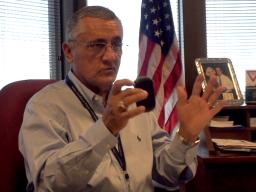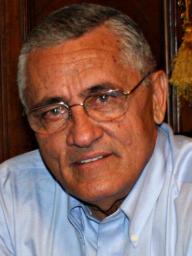- Slug: BC-CNS-Distracted Driving,565
- With: BC-CNS-Distracted Driving-Box
- Photos available (thumbnails, captions below)
By ELIZABETH SHELL
Cronkite News Service
PHOENIX (Thursday, Sept. 17) _ Banning texting while driving would make Arizona safer, but such a law would be prohibitively difficult to enforce and would fail to address the wider issue of distracted driving, the director of the Governor’s Office of Highway Safety said.
“Texting and driving is a horrendous practice,” Alberto Gutier said in an interview this week with Cronkite News Service. “But we also need to look at the whole issue. It’s not text messaging only, it’s all distracted driving.”
Nineteen states and the District of Columbia ban texting while driving, and six states plus the District of Columbia require drivers to use hands-free devices for cell phones, according to the Governors Highway Safety Association. Maine recently banned all forms of distracted driving.
The Arizona State Senate this year voted down a bill that would have fined drivers $50 for failing to use hands-free devices or for text-messaging while driving. It would have raised the fine to $200 for drivers involved in accidents.
Legislation aside, Gutier said it’s important to get the word out that cell phone use and driving don’t mix.
“People do dumb things while driving,” he said. “A national, local and state media campaign on the dangers of texting or using the phone is as important as a law on the books.”
Gutier also questioned whether it’s necessary to legislate what he said should be common sense.
“Let’s not become a nanny state where everything has to be legislated and mandated,” he said. “We have a lot of other issues that are more important.”
He noted that the city of Phoenix has issued only a handful of citations since banning texting while driving in 2007.
“I’ll support anything that saves lives, but it’s almost impossible to enforce and even less easy to prove,” Gutier said.
Linda Gorman, public affairs director for AAA Arizona, said her organization wants a law requiring drivers to use hands-free devices when talking on cell phones.
“That way, it tackles both issues: texting while driving and how to enforce it.”
California is among the states with such a requirement.
Greg Stanton, a deputy attorney general who as a city councilman pushed for Phoenix’s ban on texting while driving, said he expects the federal government to force states to ban texting while driving by making that a condition for receiving highway funding.
“It’s similar to how drunken driving laws and safety belt laws were enacted in Arizona,” he said. “The federal government says, ‘I will revoke this federal transportation money you get to build roadways unless you pass a law banning this activity.'”
Rep. Steve Farley, D-Tucson, said it would make sense for lawmakers to take on texting while driving because it’s so dangerous. He cited a 2007 Cronkite/Eight Poll suggesting that nearly nine out 10 Arizonans in favor of such a ban.
“Texting increases your chance of getting into an accident 23 times,” said Farley, whose bill calling for a ban wasn’t heard in committee this year. “That puts it in a whole other league than any other type of distraction.”
Gutier said he is a defensive driver who doesn’t speed, pulls over to take phone calls and slows down to go through green lights. Part of this is due to a crash he and his wife were in in 2002, when another driver ran a red light.
“A one-second distraction can be the difference between life an death,” Gutier said.
^___=
Web Link:
_ Governor’s Office of Highway Safety: www.azgohs.gov
^___=
PHOTOS: Click thumbnails to see full-resolution images.

Alberto Gutier, director of the Governor’s Office of Highway Safety, holds up a cell phone while explaining why he’d rather educate people about the dangers of texting while driving than having a law that would be almost impossible to enforce. (Cronkite News Service Photo by Elizabeth Shell)
